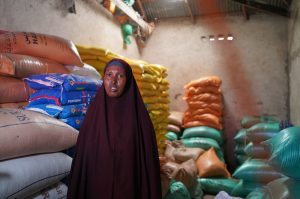The civil war in Somalia led to women assuming dual roles as primary earners and caregivers, with 70% of households relying on them for financial support and the creation of enterprises within the country. Despite their dominance in the informal sector, women and youth encounter persistent challenges in accessing credit due to historical financial underdevelopment and structural barriers such as limited collateral, financial literacy gaps, gender bias in loan approval, and social-cultural norms. Moreover, the criteria for securing a bank loan often does not align with the characteristics of women’s small-scale businesses, as they may struggle to provide a guarantor or fixed assets as collateral in many cases. Additionally, approximately 74% of women-owned businesses in Somalia lack bank accounts and are not formally registered with the Somaliland Chamber of Commerce underscoring an underdeveloped financial environment characterized by a predominant cash-based economy with limited access to formal banking services.
Recognizing the pivotal role that women’s economic empowerment plays in reducing poverty, advancing sustainable development and eliminating inequalities, the Finance for Inclusive Growth (FIG) in Somalia program, an EU-funded initiative under the European Union’s Inclusive Local and Economic Development (ILED) program and implemented by Africa Enterprise Challenge Fund (AECF) through local Micro Finance Institutions (MFIs), aims to tackle these challenges through a gender lens investing approach. By strategically allocating 40% of total loans to women, 30% to youth, and 30% to producer groups, the program is championing the inclusion of women businesses in accessing formal credit products.
In October 2023, the FIG Somalia program surpassed its EUR 8 million lending target, disbursing US$10.3 million in loans with a near-equal split between women (49%) and men (51%)4 This success stems from a collaboration with MFI’s such as IBS Bank and Microhadab MFI, who offer tailored innovative products that empower women entrepreneurs who previously had limited access to formal lending through flexible financing. For instance, the IBS bank loan product “HAWAKEEN KAAB” (Somali Financing Women Fund) is developed to strengthen women’s participation in the financial sector, allowing women micro-entrepreneurs to access loans and technical assistance through coaching and training.
Over the years, the FIG investment vehicle has been successful in reaching 73% of businesses seeking their first loan. However, a gender disparity exists in first-time loan acquisition, with only 21% of female-owned businesses in the portfolio of FIG’s partner banks being first-time borrowers, over half the proportion of first-time male borrowers (49%). A higher percentage of youth-owned businesses (53%) acquired their first loan, surpassing adult-owned businesses (40%). While there are positive signs of women and youth accessing formal credit products for the first time, the social-cultural norms within the Somali community significantly influence the investment and utilization of loans.
“Three microfinance loans later, my shelves are stocked, business is booming, and I have a team of five employees,” says Salada Abdullahi Abikar, a resilient trader from Bakaro, Somalia. “I am grateful to IBS Bank and FIG-Somalia for believing in my dream,” she adds.

This illustrates how women utilize their disposable capital and income in various ways, highlighting the importance of securing access to financial resources, including business loans. Such access remains crucial for women to invest in their businesses and vital areas such as education, healthcare, and essential family needs.
Efforts to enhance women’s financial access in Somalia include the introduction of Village Saving and Loan Association groups (VSLA) for women. These groups offer internal collateral, provide accessible training to ensure demand for financial products, and facilitate support in the recruitment of female loan officers by MFIs. These officers play a critical role in fostering open discussions with women about financial matters, empowering them to actively participate in financial decision-making.
Moreover, extensive training has been provided to MFI Loan officers regarding the loan process, resulting in a more streamlined approval procedure. The loan repayments have been successful, with no clients defaulting on their scheduled repayments, apart from occasional delays from some clients, particularly those affected by incidents such as shop burnings in Mogadishu and Hargeisa’s central market.
Despite these challenges, clients, especially women SME owners, demonstrated flexibility in repaying their loans after the MFIs rescheduled their repayment terms.
This is evidenced by the remarks from MFI Loan officer “We did not expect this high level of compliance, considering the vulnerabilities of the targeted clients. But the program’s support in training our staff on know-your-customer was key in due diligence and creating a friendly atmosphere between our loan officers and the clients.’’ Additionally, the establishment of a partial guarantee fund encouraged MFIs to risk lending to clients without tangible collateral, aligning with the principles of gender lens investing to motivate MFIs to engage confidently in commercial enterprises.
Achieving gender equality in Somalia’s financial services requires strategic collaboration to promote gender-sensitive investing and improve financial inclusion for marginalized groups, especially women and youth entrepreneurs. Continued investments in financial literacy, capacity building, and policy reforms are crucial to advancing women’s economic empowerment, recognizing their critical role as drivers of the economy. By fostering inclusivity and gender equality in financial services, Somalia can unlock the full potential of its diverse entrepreneurial ability, fostering sustainable development and prosperity across society.
